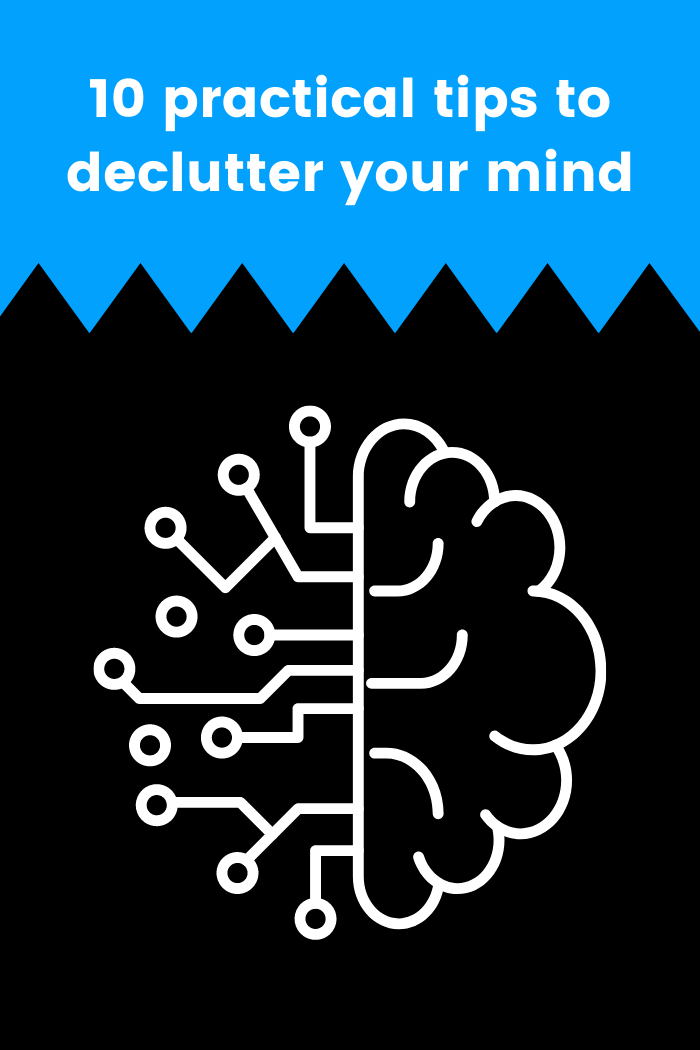10 practical tips to declutter your mind

Parent Post
Do you feel like
Do you feel like your brain is in serious overdrive? Is a stream of clutter slowly turning your mental space into a chaotic mess? If yes, your mind is frantically waving a red flag, begging you to free up some headspace.
Getting rid of all that non-essential mental baggage is crucial to stay focused, motivated, and productive.
Here are 10 simple yet effective tips to help you declutter your mind.
Breathe Take a deep breath.
Breathe
Take a deep breath. Pause. Exhale slowly. Repeat.
Deep breathing is a simple yet effective technique to clear your mind, induce tranquility and elevate your mood instantly. It lowers the heart rate and blood pressure and stimulates the parasympathetic nervous system which helps your body relax.
Breathing exercises also promote concentration and strengthen your immunity system
Be decisiveWhen you constantly
Be decisive
When you constantly put off making decisions, your brain becomes overwhelmed by those pending decisions. For simple decisions, carefully evaluate the pros and cons and don’t look back once you’ve made up your mind.
For more important decisions, you can try the WRAP method, a technique discussed by the Heath brothers in decisive: how to make better choices in life and work.
Limit the amount of
Limit the amount of media intake
We spend hours online: reading blogs, managing Pinterest boards, or watching viral videos on YouTube. This abundance of information can clog your brain, causing stress and anxiety.
Limiting the amount of information you consume is necessary to get rid of all that media-related clutter from your mind.
Start by setting a limit on the amount of time you spend on social media. Also, be selective about your media consumption (avoid negative content, follow only reliable media outlets for news updates) and organize your email regularly.
Learn to let goAccept
Learn to let go
Accept yourself, love yourself, and keep moving forward.
Let go of all the negative thoughts and emotions that make you feel bogged down.
Monitor your thoughts regularly and try to replace negative thoughts with positive ones.
Take some time to
Take some time to unwind
Last but not the least, take a break!
Switch off your phones and laptops and do something that makes you feel happy. Whether it’s a long nap or a walk in the park.
Avoid multitaskingWhile there’s no
Avoid multitasking
While there’s no harm in occasional multitasking, constant juggling between tasks limits your attention span, increases stress and creates additional clutter by making it difficult for your brain to filter out irrelevant information.
Heavy multitasking lowers efficiency and may impair your cognitive control.
Make a list of things you need to accomplish that day. Keep the to-do list simple and realistic. Start with what’s most important and make your way down the list, completing one task at a time.
Declutter your workspacePeople with
Declutter your workspace
People with a messy workspace are less efficient and more frustrated than those who have an organized work desk.
Start by getting rid of all the non-essential items and assigning a proper place to everything. The best way to keep things organized without feeling overwhelmed is to clean up your work desk every day before you go home.
Set prioritiesPrioritizing is a
Set priorities
Prioritizing is a great way to proactively take charge of your life. Prepare a list of your top priorities and make sure that your actions and the decisions you take reflect the priorities you set.
Next, create an action plan to meet those set goals.
Your list of priorities might change but check in with yourself regularly.
Keep a journal Journaling is
Keep a journal
Journaling is a great way to relax your mind by analyzing and organizing your thoughts.
Expressive writing eliminates intrusive thoughts about negative events and improves working memory.
Writing in a daily journal can also help manage anxiety and cope with depression, as it’s a healthy outlet to release bottled emotions.
You don’t have to be a prolific writer to start a journal. For beginners, bullet journaling is one of the easiest techniques to try out.
Share your thoughtsTalking to
Share your thoughts
Talking to a loved one about how you feel is a great way to release pent-up emotions.
Sharing your thoughts with others can also help you look at things from a fresh perspective which can help you think clearer and make better decisions.

